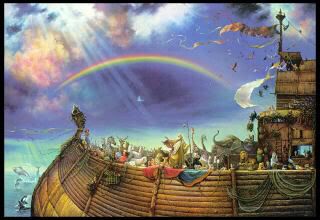
I'm really sick of the way skeptics take themselves so seriously to express anger toward God when it's clearly obvious that God isn't the way the straw men have set him up to be. Most of this tendency goes back to taking the Bible literally. The flip side of this is the way some Christians learn to justify teh literal image as though it's really he point of the Bible an never stop to ask themselves, "what is this text really saying to me?"
The fact that most of the OT is narrative is a que for us. We should think "read between lines." It's not magic, it's literature you read it the way you would any other literature. You can understand the author probably has a point to make that is not obvious and the literal surface of the story is not the ponit, because in a narrative other than a children's story it seldom is. Even in children's stories we can sometimes sense that mroe is gonig on than just the gingerbread house where the witch eats children. I mean, come on. The step mother ties to kill the kids and you don' think more is going on thant he surface of the story?
So take the flood for example. What kind of text is it? We should always ask this first. Its' mythology. How do we know? Because it's just like other texts of the same myth that are much older. So obvioulsy the Hebrew redactors, in using a popular universal story that had been a mainstay of thier world for thousands of years (the origianal Suemrian epic is copied by the Babylonians and datesa bout 2000 years older than Genesis--in the Sumerian myth of Eden the Sumerian Adam is named Adam, but Eve is Adapa. In Sumerian flood story--Gilgamesh--Noah is Upnapishtim).
While the skeptic looks at the flood and says "O gee, God is cruel and evil to kill all those people, he must have afraid to let people have fun" or whatever they might say, we know that'snot the point. We have to look past the sruface plot. It's not about God being angry and killing everyone,that's just a plot device because they used a pagan myth that was already around. That's just part of the story that's a given for them. So let's ask ourselves why would they uset his story rather than make up their own? Because they have a point to make about what the pagan story says. What is says basically is that the gods were capcrecious. They destroyed the world because people were making too much noise.It also says Upnapistem survived the flood so Gilgamesh seeks him out to learn the secret of eternal life. The Hebrews are saying God is not caprious but if he did destroy the world he would do so for moral reasons and for good reasons not because they are making too much noise.
Our modern skeptics who know so little of the ancient world can only compare the story with our value system and since they expect everything to hold their values (modern skeptics are so ethnocentric) they conclude that gods not good because he doesn't hold their values. They just don't see that actually Genesis is closer to expressing the value with which they agree than are the original myths from which barrows. Then the point about eternal life, the point in Genesis is that God will keep us safe throuig the danger and give us new life if we hold fast in faith. Eternal life comes from faith in God, not form fate or luck.
These are the kinds of ponits being made by the story, not "you better shape up or God will kill you." The cruelty of God in tho flood story is just handed down from a previous version and has nothing to do with thei real encounter of th divine that Christians expernce. Of course God would never really kill all the people of the world in that way.
Bukt here's antoher point, we might be killing ourselves and since we aren't willing ot lsiten to God he can't warn us.

No comments:
Post a Comment